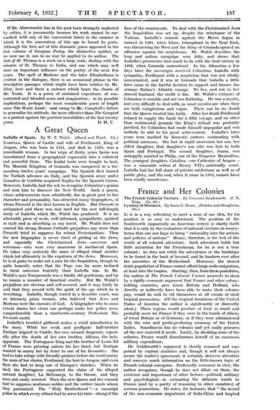A Great Queen
Isabella of Spain. By W. T. Walsh. (Sheed and Ward. 15s.) ISABELLA, Queen of Castile and wife of Ferdinand, King of Aragon, who was born in 1451, and died in 1504, was a remarkable woman. In her reign of thirty years Spain was transformed from a geographical expression into a coherent and powerful State. The feudal lords were bought to heel. The Moorish Kingdom of Granada was conquered in a tre- mendous twelve years' campaign. The Spanish fleet barred the Turkish advance on Italy, and the Spanish army under Gonsalvo de Cordoba acquired Naples for the Spanish Crown. Moreover, Isabella had the wit to recognize Columbus's genius and sent him to discover the New World. Such a queen, whose achievements were admittedly due in great part to her character and personality, has attracted many biographers, of whom Prescott is the best known in English. But Prescott is antiquated and there was real need for the new full-length, study of Isabella which Mr. Walsh has produced. It is an admirable piece of work, well informed, sympathetic, spirited in style and as absorbing as any novel. Mr. Walsh does not conceal his strong Roman Catholic prejudices any more than Prescott tried to suppress his robust Protestantism. Thus the new biographer is never tired of girding at the Jews, and especially the Christianized Jews--conversos and marranos—who were very numerous in mediaeval Spain. He takes very seriously the cases of alleged ritual murder which led ultimately to the expulsion of the Jews. Moreover, he is at pains to make out a case for the Inquisition, though he quite honestly notes that the Pope was far more inclined to treat converses leniently than Isabella was. In Mr. Walsh's eyes Torquernada was a kindly old gentleman, and by no means a monster of fanatical cruelty. But Mr. Walsh's prejudices are obvious and self-avowed, and it may fairly be said that they accord with the spirit of the age which he is describing. Isabella, though reared in a dissolute court, was an intensely pious woman, who believed that Jews and Moslems were the enemies of God. A biographer who to sonic extent shares her views can perhaps make her policy more comprehensible than a nineteentli-century Protestant like Prescott could.
Isabella's troubled girlhood makes a vivid introduction to the story. While her weak and profligate half-brother Enrique reigned in Castile, her case seemed desperate, especi- ally after the death of her own brother, Alfonso, the heir- apparent. The Portuguese King and the brother of Louis XI of France were pressing suitors for her hand, but Enrique wanted to marry her by force to one of his favourites. She had to take refuge with friendly prelates before she could marry the man of her choice, Ferdinand, the heir to Aragon, and even then she had to keep out of Enrique's clutches. When he died, the Portuguese supported the claim of his alleged natural daughter, La Beftraneja, to the throne, and they were not easily worsted. Then the new Queen and her consort had to suppress mutinous nobles and the robber bands whom they patronized. The "Holy Brotherhood "—a conscript police in which every citizen- had to serve his turn—changed the
face of the countryside. To deal with the Christianized Jews the Inquisition was set up, despite the reluctance of the Vatican. Isabella's crusade against the Moors began in earnest in 1481, when Islam, triumphant in the Near East, was threatening the Wed and the King of Granada opened an offensive against his neighbours. Mr. Walsh describes the long and ardous campaign very fully, and shows that Isabella's persistence had much to do with the final victory in 1492, when Granada surrendered. In the Alhambra a few days later the sovereigns received Columbus, Isabella with sympathy, Ferdinand with a scepticism that was not wholly unwarranted, and it was at Granada that Isabella a little later came to the fateful decision to support and finance the strange Italian's Atlantic voyage. To her, and not to her shrewd husband, the credit is due. Mr. Walsh's estimate of Columbus is sensible and not too flattering. He was a mystic, and very difficult to deal with, as most mystics are when they arc both vainglorious and vague. There can be no doubt that the Queen treated him fairly. After her death Ferdinand refused to supply the funds for a fifth voyage, and on other than sentimental grounds the King's refusal was probably justified, for Columbus had made himself unpopular and was unlikely to add to his great achievement. Isabella's later years were marked by domestic sorrows contrasting with political successes. She lost in rapid succession her son, her eldest daughter, that daughter's son who was heir to both Spain and Portugal. The second daughter, Juana, was unhappily married to Philip, son of the Emperor Maximilian. The youngest daughter, Catalina—our Catherine of Aragon— was a miserable widow at Henry VII's unfriendly court. Isabella had her full share of private misfortune as well as of public glory, and the end, when it came in 1501, cannot have been wholly unwelcome.








































 Previous page
Previous page